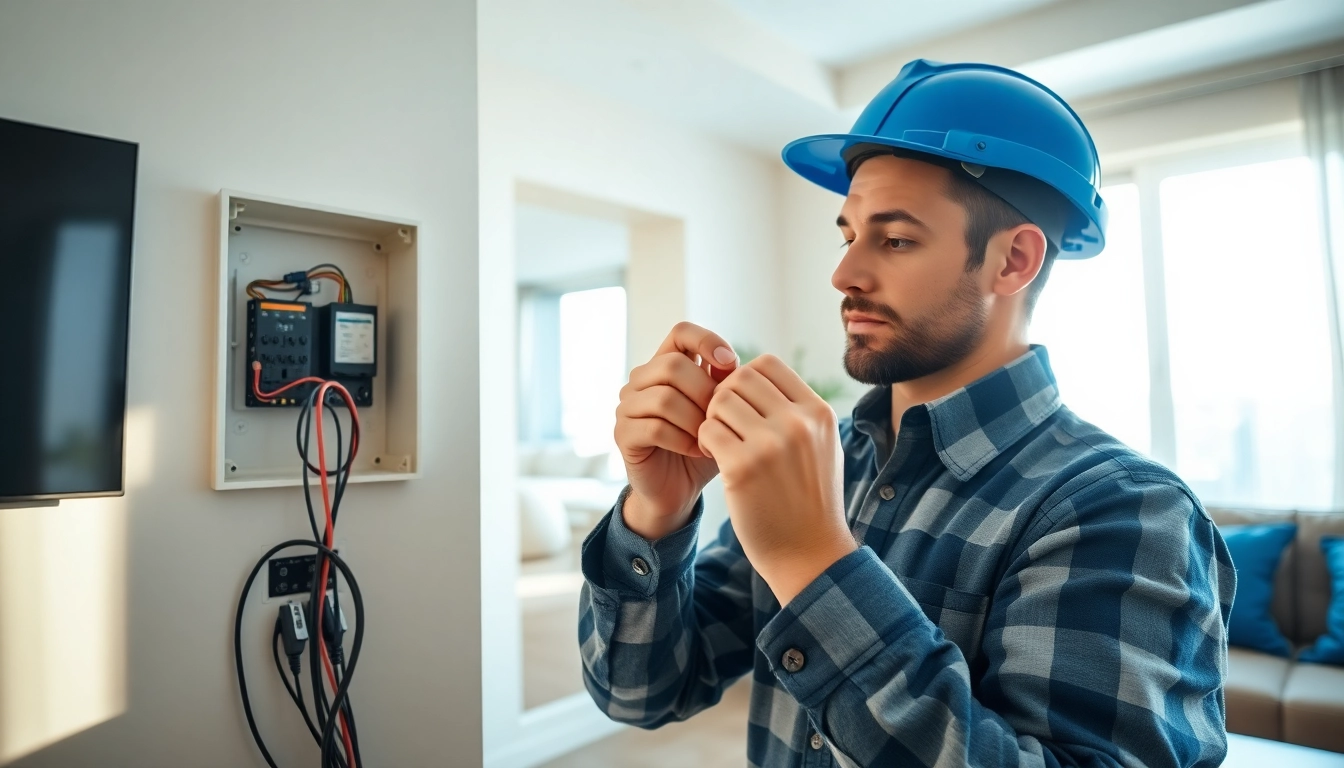Understanding Electrical Service and Its Importance
What is Electrical Service?
Electrical service refers to the provision of electricity to a residential or commercial property, enabling the functionality of electrical appliances and systems. It encompasses the entire spectrum of electrical work, which includes installation, repair, maintenance, and upgrade of electrical infrastructure. This service is critical for ensuring that buildings have a reliable power supply, facilitating daily activities, and supporting various types of machinery and technology.
In a broader context, Electrical Service also pertains to the utilities provided by power companies, ensuring the safe transmission of electricity from generation plants to consumers. Understanding the intricacies of electrical service helps property owners ensure safety, compliance with local regulations, and efficiency in energy consumption.
Key Components of Electrical Service
The electrical service setup comprises several critical components, each playing a vital role in its overall functionality:
- Service Entrance: This is where electricity first enters a home or building, consisting of the meter and the service panel. The service panel distributes electricity through circuit breakers to different parts of the property.
- Circuit Breakers: These devices automatically shut off electrical circuits in the event of overloads or short circuits, serving as a crucial safety feature in electrical systems.
- Wiring: This includes all the electrical wires that distribute power throughout the property. Different types of wiring are used, depending on the particular needs and building codes.
- Grounding System: A grounding system is essential for safety, allowing excess electricity to be directed safely into the ground, thereby preventing electric shock and damage to appliances.
- Outlets and Switches: These are the access points for electrical devices and control systems in a building, directly affecting user experience.
The Role of Electrical Service in Home Safety
Home safety is intricately tied to an effective electrical service. Faulty wiring, outdated systems, or improper installations can lead to serious hazards, including electrical shocks, fires, and equipment damage. Regular inspections and timely updates of electrical systems can mitigate these risks. Homeowners should be aware of warning signs, such as flickering lights, tripped breakers, and burning smells, that necessitate urgent attention to electrical service.
Furthermore, adhering to local electrical codes and standards is not only mandatory but also a proactive approach to safeguarding a home. Engaging qualified electricians for installations and repairs is essential in maintaining a safe electrical environment.
Types of Electrical Services Offered
Residential Electrical Services
Residential electrical services cater specifically to homeowners, encompassing a wide range of tasks:
- Installation: This includes light fixtures, ceiling fans, outlets, and appliances, ensuring that they are set up correctly and are safe to use.
- Repair: Addressing issues such as malfunctioning outlets, flickering lights, or faulty switches.
- Maintenance: Regular inspections and servicing to prevent potential hazards, improve efficiency, and ensure compliance with standards.
- Upgrades: Enhancing existing systems for more power to accommodate new technology and appliances, including panel upgrades and installing additional circuits.
Commercial Electrical Services
Commercial electrical services differ in scale and complexity compared to residential services. Key offerings include:
- Energy Audits: Assessing power usage and recommending ways to improve efficiency, which can reduce operating costs significantly.
- Lighting Solutions: Providing tailored lighting designs that enhance productivity and safety in commercial spaces.
- Data Cabling: Installing network cabling and electrical systems that support IT infrastructure, crucial for modern businesses.
- Emergency Services: Offering rapid response for electrical failures to minimize downtime, crucial for commercial operations.
Specialized Electrical Services
Beyond standard offerings, specialized electrical services cater to unique needs and applications, including:
- Solar Energy Solutions: Installation and maintenance of solar panels that harness renewable energy, helping businesses and homeowners reduce their carbon footprint.
- Smart Home Installations: Integrating advanced technology like smart lighting, thermostats, and security systems that enhance convenience and security.
- Industrial Electrical Services: Custom solutions for manufacturing units, including machinery installation, maintenance, and automation services.
Choosing the Right Electrical Service Provider
Essential Qualifications and Certifications
When selecting an electrical service provider, verifying qualifications and certifications is paramount to ensure safety and compliance. Look for:
- Licenses: A valid license proves that the electrician has passed the necessary exams and meets local requirements.
- Insurance: This protects both the homeowner and the electrician in case of accidents or damages during work.
- Certifications: Consider providers certified by recognized organizations, which signifies expertise in specific areas, such as renewable energy installations or safety standards.
How to Evaluate Electrical Service Costs
Understanding costs associated with electrical services can empower consumers to make informed decisions. Factors that influence costs include:
- Type of Service: Installation, repair, or maintenance service will come at different price points.
- Material Costs: Prices of materials such as wiring, panels, and fixtures directly affect overall costs.
- Labor Rates: The experience and qualifications of the electrical service provider will impact labor rates.
- Time Required: More complex jobs that require additional time will naturally incur higher costs.
It is advisable to obtain multiple quotes and compare them, which can often highlight significant differences and help in making the best financial choice.
Reading Reviews and Testimonials
Customer reviews and testimonials provide valuable insights into the reliability and quality of electrical service providers. Potential customers should consider:
- Reputation: A provider with consistently positive reviews is often indicative of high-quality work and satisfied clients.
- Specific Experiences: Look for reviews that detail specific services received, as they can provide a clearer picture of the provider’s expertise and customer service.
- Response to Complaints: How a company responds to negative feedback can reveal its commitment to customer satisfaction.
Common Electrical Service Issues and Solutions
Frequent Electrical Problems in Homes
Certain electrical issues are common in residential settings, and identifying them early can prevent more serious problems. Some frequent challenges include:
- Tripped Circuit Breakers: This may indicate overloads or faulty appliances. Solutions involve identifying the cause and upgrading circuits as necessary.
- Flickering or Dimming Lights: Often caused by poor connections or issues in the wiring. Inspection and potential rewiring may be required.
- Hot Outlets: Outlets that feel warm to the touch may be hazardous. This requires immediate attention from a qualified electrician to avoid fire risks.
Emergency Electrical Services
Electrical emergencies can occur without warning, posing significant risks. Homeowners should understand how to handle these situations effectively:
- Immediate Action: In cases of electrical fires or shocks, it’s critical to cut off the power and call emergency services.
- Regular Preparedness: Having the contacts of reliable emergency electricians readily available ensures fast response in critical times.
- Annual Inspections: Annual inspections can help detect and mitigate risks before emergencies arise.
Preventative Maintenance for Electrical Systems
Preventative maintenance can extend the lifespan of electrical systems and enhance safety. Recommended practices include:
- Routine Inspections: Regular assessments by professional electricians help identify potential hazards before they escalate.
- Upgrading Outdated Equipment: Replacing old wiring and circuit breakers that do not meet current safety standards can prevent many issues.
- Grounding Checks: Ensuring that all systems are properly grounded helps protect against surges and improves electrical safety.
Future Trends in Electrical Services
Smart Home Electrical Solutions
The proliferation of smart home technology is revolutionizing electrical services. Homeowners are increasingly integrating smart systems that allow remote control of lighting, thermostats, and security features from mobile devices. As this trend continues, electricians will need to be adept at installing and troubleshooting these advanced systems.
Additionally, smart home technology often includes energy monitoring capabilities, allowing consumers to track their electrical usage and make informed decisions about energy conservation.
Sustainable and Energy-Efficient Practices
As global focus shifts towards sustainability, the electrical service industry is adapting with environmentally friendly practices. This includes the installation of energy-efficient appliances, LED lighting, and renewable energy systems like solar panels. Electricians will increasingly be called upon to provide consulting and installation for green technologies, playing a pivotal role in reducing carbon footprints.
The Impact of Technology on Electrical Services
Technological advancements are enhancing the efficiency of electrical services. Innovations include:
- Drones: Used for inspection of electrical infrastructures, drones can provide quick assessments of hard-to-reach areas, minimizing labor costs and safety risks.
- Augmented Reality (AR): Utilized in training and remote assistance, AR tools can provide real-time guidance for electricians during repairs and installations.
- Smart Meters: These devices provide real-time data on electricity usage, helping consumers manage their energy consumption more effectively.



